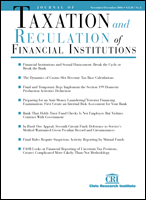Complete Issue
Author: Houman Shadab.
Source: Volume 26, Number 05, May/June 2013 , pp.1-64(64)

< previous article |return to table of contents
Abstract:
Social media has the potential to greatly alter how people and companies interact in a wide range of areas, and the financial services industry is no exception. In our first article, Rajib Chanda and Steve Zaorski discuss the use of social media by financial institutions. They argue that financial institutions should embrace social media more aggressively than they have thus far—despite the regulatory concerns and uncertainty involved. In the authors’ view, financial services firms should increase their use of social media in the areas of branding, mobilizing groups, search, and customer service. A phenomenon closely related to social media is the raising of capital through social platforms, more commonly known as “crowdfunding.” In this issue’s second article, Richard B. Levin, Jonathan Nowkowski, and Aaron A. O’Brien discuss the Jumpstart Our Business Startups Act of 2012 (the “JOBS Act”). The authors focus on how the JOBS Act enables crowdfunding by exempting it from standard federal registration and disclosure requirements. They also discuss related aspects of the JOBS Act, including the exemption from registration as broker-dealers for platforms that enable private offerings, and the Act’s permitting general solicitation by private investment funds. Private investment funds are often structured as limited partnerships, and in our third article, Jon R. Stefanik examines the tax issues that apply when financial institutions invest in partnerships. Mr. Stefanik in particular focuses on the allocation of partnership liabilities for tax purposes and nonrecourse liabilities, using several examples to amplify his discussion. The final two articles in this issue focus on the complex issue of mortgage foreclosure litigation as it interacts with the Uniform Commercial Code (UCC). John Vassalotti, Eric M. Hurwitz, and Andrew K. Stutzman examine a prominent defense to foreclosure. Namely, they discuss the merits of the argument that a foreclosing party lacks standing because the underlying loan fails to qualify as a negotiable instrument under the UCC due to its imposition of a prepayment notice obligation on the borrower. In our final article, Joseph J. Patry likewise analyzes the issue of standing to foreclose, but focuses on different challenges, addressing such issues as compliance with various technical requirements under state law. Mr. Patry also examines the requirements of foreclosure statutes in non-judicial foreclosure states.Keywords: Social media; crowdfunding; “JOBS Act”; foreclosure
Affiliations:
1: New York Law School.